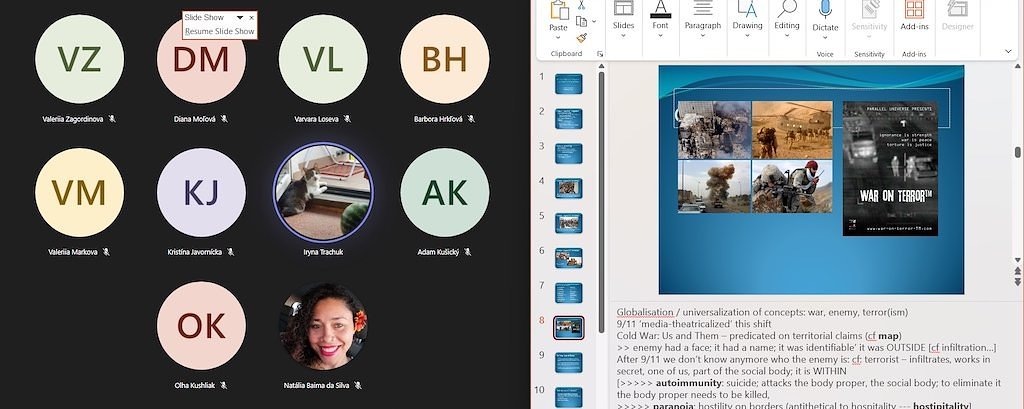The First Course of the EUPECCOM Project

Our course ‘War on Terror across media’ successfully wrapped in the middle of December. A total of 15 students participated – all studying at BA level at the Department of English Language and Literature.
The response was generally positive and participation was also intense, although, as is the case with most courses of this sort, some students were willing to engage more actively whilst others remained of the receptive end of the scale for the major part of the semester.
The course covered both theoretical framings as well as practical, real-life examples of representations and mediations of violence, hostility, conflict, terrorism, notions of the territory and the border, instances of cultural clashes, and practices of social exclusion and inclusion.
The intended learning outcomes were multiple:
- Understanding Media Framing: to help students understand how media frames events and issues, particularly in the context of the US’ War on Terror. This understanding can be crucial for students who aspire to work in intercultural contexts.
- Critical Analysis Skills: students learned to understand and critically reflect on the narratives presented in the media, and how these narratives can influence public opinion and policy.
- Historical Context: The War on Terror has had far-reaching implications globally. Studying its representation in news media, social media as well as in fictional forms provided students with a historical context and helped them understand the evolution of global politics and international relations.
- Ethics in Journalism: our discussions also highlighted the ethical considerations in media coverage. For instance, post 9/11, the media's reaction was largely supportive of the war, but attitudes have changed over time. This led to discussions on the role of media in society and the ethical responsibilities of journalists.
- Cultural Studies: there were multiple discussions focusing on the ‘iconography’ of terrorism and of the terrorist as such. Analysis of these instances helped us map the varying and diverse stereotypes framed and circulated by media forms and representations.
What made the course particularly interesting, and also, from an instructor’s point of view, also challenging at times, was the fact that it was taught to a culturally diverse class: approximately half of the participating students were from Ukraine, and there were some others from Georgia (here on Erasmus), from Russia (a regular student enrolled at the faculty), and one who was originally from Brazil.
Some of the anticipated challenges included:
- Sensitive Topics: The War on Terror, and by extension, conflict and violence involve many sensitive topics, including political, religious, and cultural issues. We had to navigate these topics carefully to ensure respectful and productive discussions.
- Diverse Perspectives: Students from different cultural backgrounds obviously had varying perspectives on the concepts of violence, territory, forms of aggression and victimization etc. The purpose was to find a way to balance these perspectives and ensure all students would feel heard
- Language Barriers: the language of instruction was not first language for the participants, and this posed some challenges in terms of formulating ideas, comprehension and participation (which, in retrospect, might explain why some students remained more passive during the course).
- Preconceived Notions: students came into the class with preconceived notions or biases about the many of the topics, influenced by media or personal experiences. These could at times be difficult to address, but on the other hand they could also serve as springboards for engaging discussions.
- Teaching Materials: Finding appropriate teaching materials that provide a balanced view of the War on Terror was not an easy task, especially as the course also tried to reflect on ongoing events (such as developments in the war between Russia and Ukraine, and the unfolding conflict in Gaza). For this reason, some of the realia had to be changed to better fit the goal of the course and to better reflect the actual global situation when the focus was to fall on discussions on that.
These challenges require instructors to be well-prepared, empathetic, and flexible in their teaching approach. However, they also highlight the importance of inclusivity in the classroom environment, and the centrality of an open discussion culture where all students feel respected and valued.
The cultural diversity of the class greatly contributed to a multiplicity of perspectives and readings, a diversity of views on conceptualizations of systemic as well as subjective forms of violence, on the role of media, and, finally, on forms of activism.
Many students connected their reflection on the texts discussed with personal, subjective, lived experiences from their home countries (and its historical specificities). Since many of the topics were rather sensitive, at times it was challenging to moderate the discussions in order for everyone to feel comfortable voicing their sometimes conflicting opinions. The students deserve a lot of commendation and appreciation for their ability to keep an open mind, exercise tolerance, and for their willingness to address very complex and sensitive issues without becoming obtrusive, polemical or downright offensive towards each other. It was particularly interesting to observe how openly they were able to discuss their views about the Russia-Ukraine war, and about the Gaza conflict whilst showing a great deal of tolerance, respect, and receptiveness to each other, even in situations where opinions differed.
The course serves as a foundation for ‘Climate-Conflict-Migration’, running in the Spring term of 2024. A number of participants of WoT already indicated their interest in taking CCM as well.
David Levente Palatinus
Funded by the European Union. Views and opinions expressed are however those of the author(s) only and do not necessarily reflect those of the European Union or the EACEA. Neither the European Union nor the granting authority can be held responsible for them.

